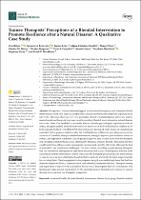Please use this identifier to cite or link to this item:
https://hdl.handle.net/20.500.12202/9451| Title: | Trainee therapists’ perceptions of a blended intervention to promote resilience after a natural disaster: A qualitative case study. Clinical psychology, clinical applications of cyberpsychology and virtual reality for mental disorders |
| Authors: | Békés, Vera Belleville, Geneviève Lebel, Jessica Ouellet, Marie-Christine Chen, Zhaoyi Morin, Charles M. Bergeron, Nicolas Campbell, Tavis S. Ghosh, Sunita Bouchard, Stephane Guay, Stéphane MacMaster, Frank P. 0000-0003-3043-5155 Bekes |
| Keywords: | telemental health therapist blended intervention alliance focus group thematic analysis |
| Issue Date: | 2022 |
| Publisher: | MDPI AG |
| Citation: | Békés, V., et al. (2022). Trainee therapists’ perceptions of a blended intervention to promote resilience after a natural disaster: A qualitative case study. Clinical psychology, clinical applications of cyberpsychology and virtual reality for mental disorders. Journal of Clinical Medicine, 11(15), 4361. |
| Series/Report no.: | Journal of Clinical Medicine; ;11(15) |
| Abstract: | _Background:_ Natural disasters happen in an increased frequency, and telemental health interventions could offer easily accessible help to reduce mental health symptoms experienced by survivors. However, there are very few programs offered to natural disaster survivors, and no research exists on therapists’ experiences with providing blended interventions for natural disaster survivors. _Aims:_ Our qualitative case study aims to describe psychologists’ experiences with an online, therapist-assisted blended intervention for survivors of the Fort McMurray wildfires in Alberta, Canada. _Method:_ The RESILIENT intervention was developed in the frames of a randomized controlled trial to promote resilience after the Fort McMurray wildfires by providing survivors free access to a 12-module, therapist-assisted intervention, aiming to improve post-traumatic stress, insomnia, and depression symptoms. A focus group design was used to collect data from the therapists, and emerging common themes were identified by thematic analysis. _Results:_ Therapists felt they could build strong alliances and communicate emotions and empathy effectively, although the lack of nonverbal cues posed some challenges. The intervention, according to participating therapists, was less suitable for participants in high-stress situations and in case of discrepancy between client expectations and the intervention content. Moreover, the therapists perceived specific interventions as easy-to-use or as more challenging based on their complexity and on the therapist support needed for executing them. Client engagement in the program emerged as an underlying theme that had fundamental impact on alliance, communication, and ultimately, treatment efficiency. Therapist training and supervision was perceived as crucial for the success of the program delivery. Conclusions: Our findings provided several implications for the optimalization of blended interventions for natural disaster survivors from our therapists’ perspective. |
| Description: | Scholarly research article / Open Access |
| URI: | https://www.mdpi.com/2077-0383/11/15/4361 https://hdl.handle.net/20.500.12202/9451 |
| ISSN: | 2077-0383 |
| Appears in Collections: | Ferkauf Graduate School of Psychology: Faculty Publications |
Files in This Item:
| File | Description | Size | Format | |
|---|---|---|---|---|
| Bekes 2022 Trainee OA jcm-11-04361-v2.pdf | 536.11 kB | Adobe PDF |  View/Open |
This item is licensed under a Creative Commons License

